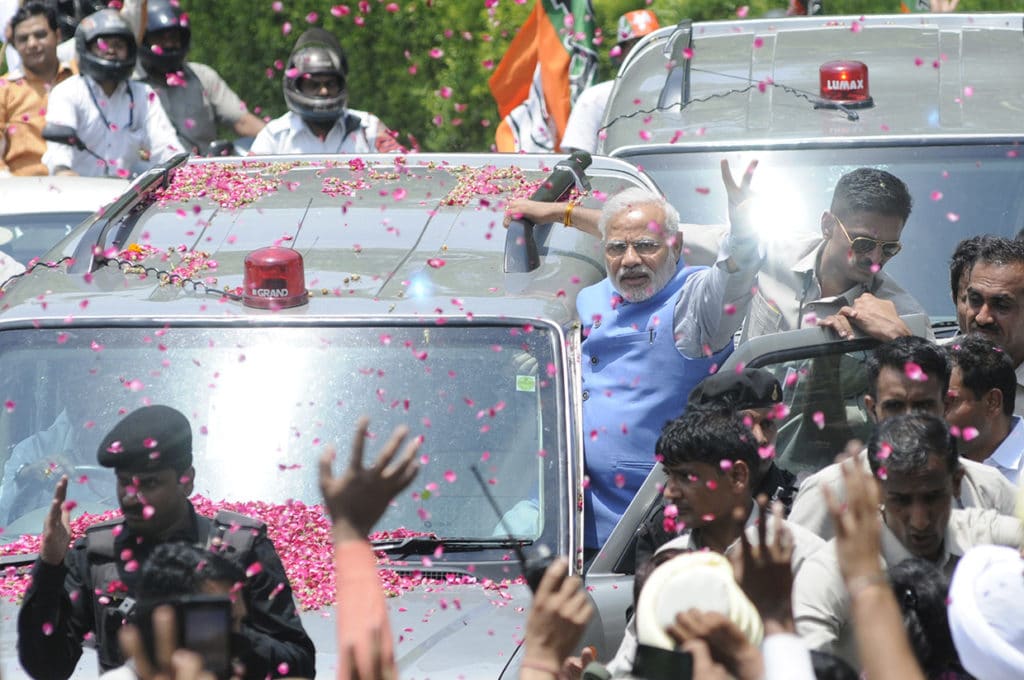India’s national sales tax might be the last big-ticket reform from Prime Minister Narendra Modi as he prepares for about a dozen of state polls and seeks re-election in 2019, government officials say.
Modi is expected to conclude already-underway measures such as the privatization of state carrier Air India then turn to issues that resonate with voters and insulate them from the impact of India’s slowing growth, said people familiar with the government’s program who didn’t want to be named, citing rules. This will include a boost to employment guarantees, irrigation and crop insurance programs, they said.
Pledging to take the economy on a higher growth trajectory, create jobs, fight corruption and eliminate red-tape, Modi won a thumping majority in the 2014 election. He is credited with making it easier to do business in India, reforming taxation and taking measures to pull banks out of their bad debt trap.
Still, while global investors look favorably at Modi, his policies have not addressed the growing disenchantment among farmers and unemployed youth and senior members from his own party have warned he will pay the price when 834 million Indians cast their ballots.
“In the near term the government will likely focus on easier to implement and more popular reforms aimed at streamlining the bureaucracy, fighting corruption and creating jobs, said Arjen van Dijkhuizen, senior economist at ABN Amro Bank in Amsterdam.
The annual budget in February would be Modi’s last chance to ramp up spending in sectors that can win him votes. His predecessors had resorted to popular moves such as farm loan waivers and employment guarantee programs in election years. Some state governments including Uttar Pradesh and Maharashtra — both ruled by Modi’s party — are already providing loan waivers. So far, the federal government has not announced its own waiver plans.
Job creation is the area that could hurt the ruling party the most. Modi has so far fallen short in fulfilling promises made to unemployed youth in 2014 and although he’s boosted expenditure on an employment program he once mocked, there hasn’t been any up-tick in private sector employment.
He’s also expected to avoid any bold measures to reform land and labor laws, the officials said, given the last time he touched upon these topics the opposition labeled him “anti-poor”.
“There is very little incentive for Modi to incite political fights over politically sensitive reforms affecting land and labor laws, particularly when he is still dealing with demonetization and opposition claims that his government mishandled GST,” said Shailesh Kumar, Senior Analyst, Eurasia Group.
Modi’s win in India’s most populous state Uttar Pradesh this year showed his popularity endured after last November’s cash ban to unearth unaccounted wealth forced people to stand in bank queues for days to withdraw their own money. But the disruption continued with the implementation of the national sales tax and while experts view these reforms as boosting the economy in the long term, it’s unclear what short-term impact they’ll have at the polls.
A Pew Research Center poll released recently, but conducted before economic growth slowed sharply, shows roughly nine-in-10 hold a “favorable opinion” of Modi, about 30 points higher than rival Congress party leader Rahul Gandhi. Public confidence in the economy and the overall direction of the country had also improved since he took office in 2014, the survey said.
A $32 billion program to recapitalize banks sitting on pile of bad loans could revive investment and save jobs. Recently, he announced a $2.5 billion plan to provide electricity to all by 2018 and $110 billion rupees plan on building roads over five years.
“Similar measures could be announced with economic and political benefits,” said Sonal Varma, chief India economist at Nomura Holdings Inc. in Singapore, noting he’s expected to focus on asset quality of banks, strategic stake sales and building infrastructure.
Calls to the prime minister’s spokesman, Jagdish Thakkar, seeking comment went unanswered.
Even as Modi tries to boost the social sector spending, he might face some headwinds. As crude has entered a bull market, fuel prices will go up at the retail level, putting him in a tough spot with voters, the officials said.
India’s economic growth has been falling for last five quarters after hitting 9.1 percent in the quarter through March last year. As inflation in Oct. accelerated at the fastest pace in seven months, Modi will try to prevent prices spiraling, the officials said. That’s another reason he may not relax his fiscal deficit target, already one of the widest in Asia.
“While its too early to forecast the budget, infrastructure spending as a means of sustaining, and building on the current growth trajectory, will likely be a key feature,” said Kumar.
© Bloomberg
